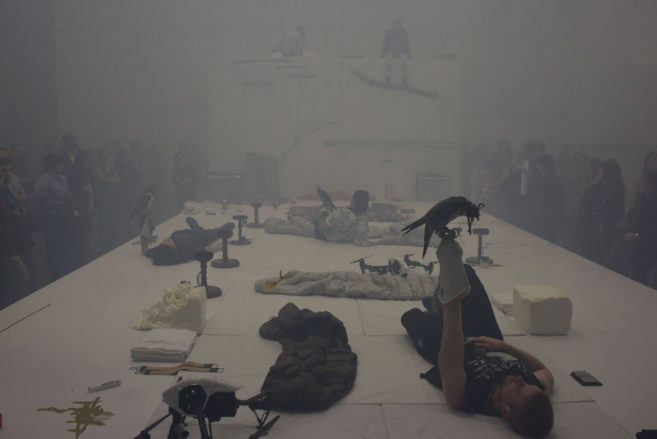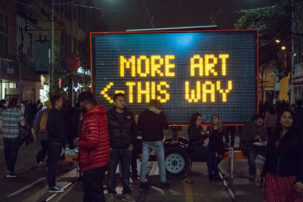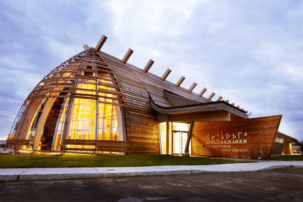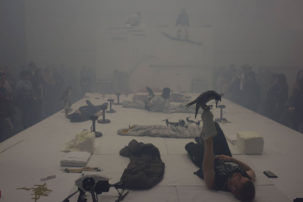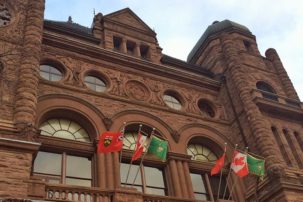Our editors’ weekly roundup of Canadian art news.
The Biennale de Montréal has confirmed cancellation of its 2018 edition due to a deficit of $200,000. The chairman of the board, Cédric Bisson, told the Art Newspaper recently that the management team gave them inaccurate figures, leaving the board in the dark about the full scope of the financial difficulties until January 2017. Bisson attributes the deficit to three main factors: management problems, expected fundraising revenues that fell through, and unforeseen costs. The biennale’s management and board still consider last year’s iteration as an artistic success: one of the biennale participants, German artist Anne Imhof, went on to win the Golden Lion for Best National Participation at the 2017 Venice Biennale. Her Biennale de Montréal piece Angst III cost $70,000 for the falcons and performers. Meanwhile, some local artists and installers, at last check, still have not been paid for their participation in the 2016 edition.
This year’s Toronto Nuit Blanche will ask artists to speculate under the curatorial thematic “Many Possible Futures,” the City of Toronto announced on Tuesday. The 12th edition takes place on September 30 from 6:58 p.m. until sunrise, and it will be the first time that the free annual city-wide 12-hour arts festival’s program responds to one overarching curatorial theme. The programming splits into four major exhibitions produced by four curators, each with their own stream of projects reflecting on resistance and revolution. A few highlights from each: artistic director at Creative Time Nato Thompson’s “Century of Revolutions” will feature Carole Condé and Karl Beveridge, d’bi.young anitafrika and Tough Guy Mountain; executive director and chief curator of the Art Museum at the University of Toronto Barbara Fischer’s “Taking to the Streets” will feature Deanna Bowen, Syrus Marcus Ware, Hazel Meyer and Abbas Akhavan; Brooklyn-based Anishinaabe visual artist Maria Hupfield’s “Life on Neebahgeezis” will feature Julie Nagam, Marianne Nicholson and Cherish Violet Blood; assistant curator at Oakville Galleries Clara Halpern’s “Calculating Upon the Unforeseen” will feature Christina Battle, Tanya Lukin Linklater and others.
Toronto-based sculptor Ellen Bleiwas is the winner of 401 Richmond’s Career Launcher Prize. Bleiwas holds a master of fine arts from York University (2017) and a master of architecture from McGill University (2010). Her sculptural installations construct seclusive spaces with felt, demonstrating “a keen understanding of materiality while at the same time invoking a corporeal relationship to constructed space,” says a press release. Since 2000, the arts incubator’s annual prize has presented a promising recent graduate of a Toronto post-secondary fine arts program with a 500-square-foot studio for one year.
The Ontario Arts Council will be receiving $50 million in additional funding from the provincial government, press releases announced this week. Funds will spread over the next four years, taking provincial funding to the OAC to $80 million annually by 2020–21. The next Ontario election is slated for 2018.
imagineNATIVE Film + Media Arts Festival—the world’s largest presenter of Indigenous screen content—announced the lineup of its 18th annual festival recently. It will screen more than 100 works of film, documentary and video by Indigenous filmmakers in Toronto this October, with almost three-quarters of the programming made by Indigenous women. Some highlights are Alanis Obomsawin’s Our People Will Be Healed, her 50th documentary in 50 years, and world premieres of Indictment: The Crimes of Shelly Chartier by Shane Belcourt and Lisa Jackson and Glwa: Resurgence of the Ocean-Going Canoe by Hillary Beattie and Vina Brown.

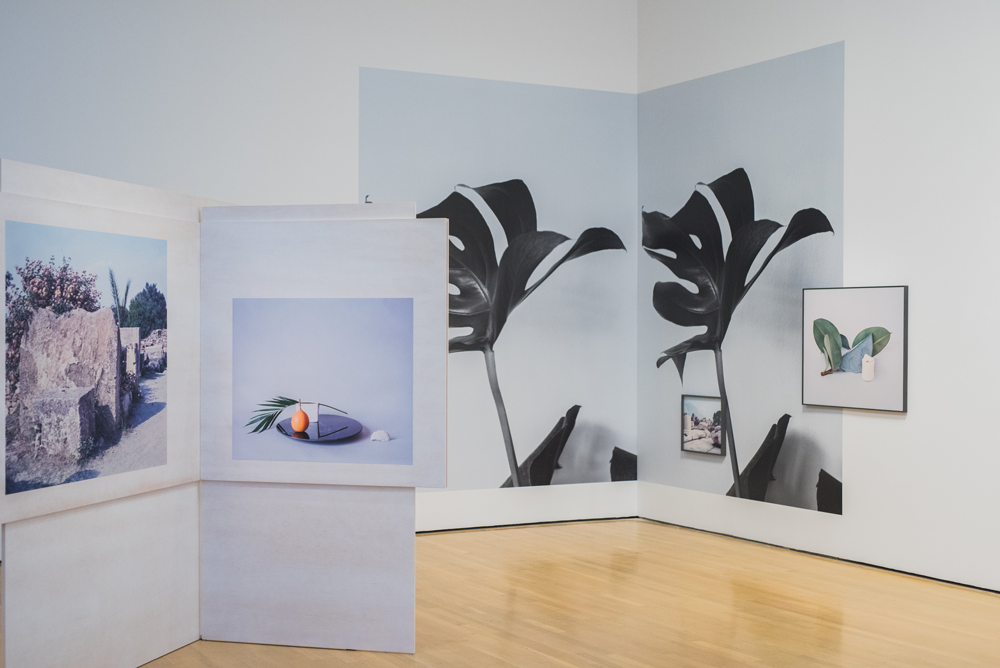 Installation view of the Biennale de Montréal 2016 at the Musée d’art contemporain de Montréal featuring Celia Perrin Sidarous, Notte coralli, 2016. Photo: Daniel Roussel. Courtesy the Biennale de Montréal.
Installation view of the Biennale de Montréal 2016 at the Musée d’art contemporain de Montréal featuring Celia Perrin Sidarous, Notte coralli, 2016. Photo: Daniel Roussel. Courtesy the Biennale de Montréal.
